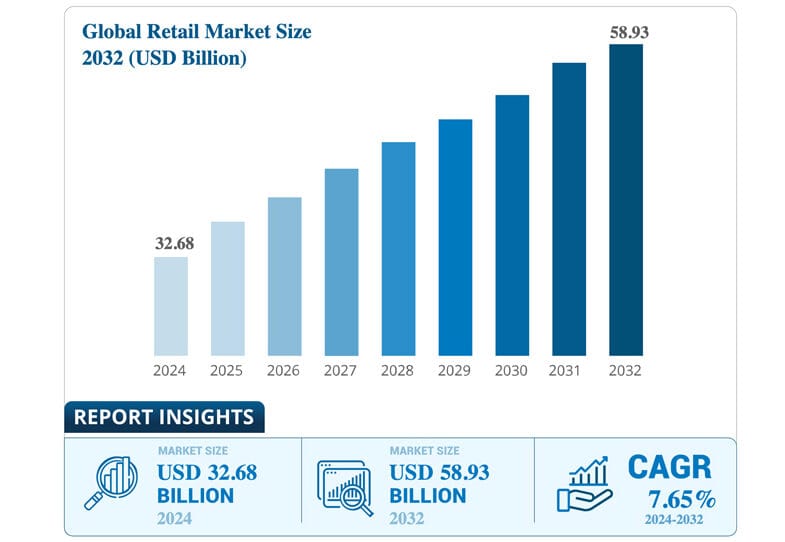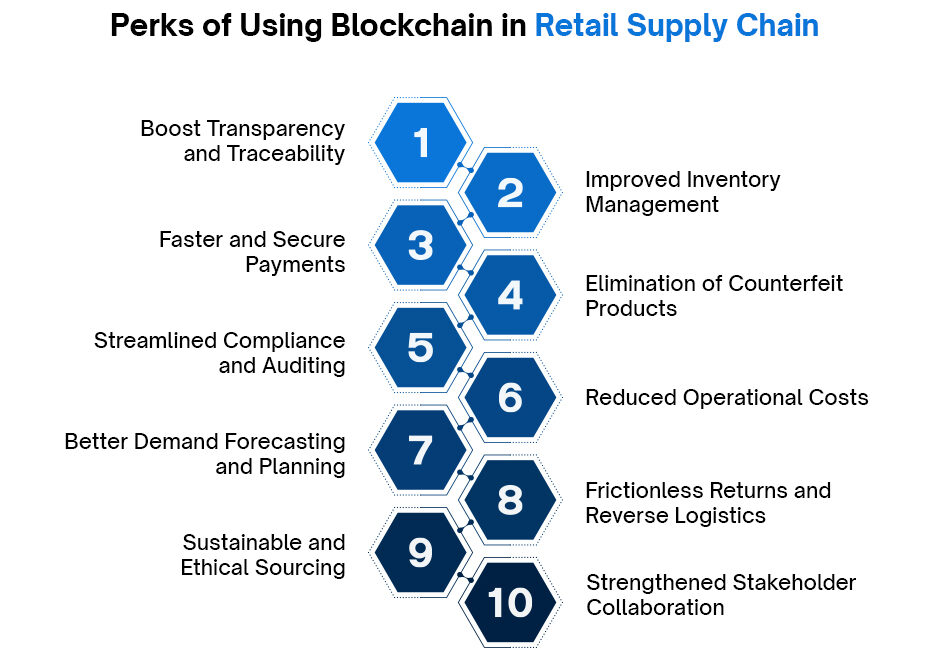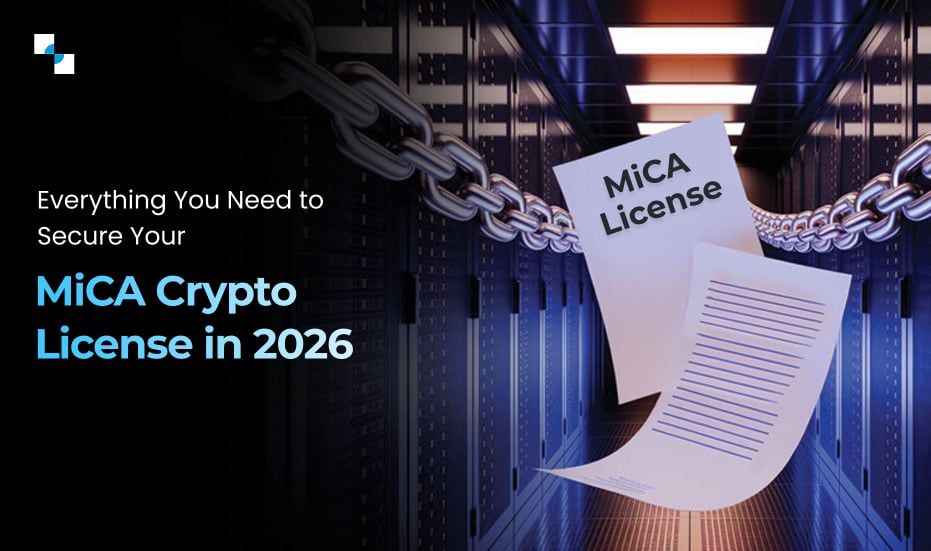The retail industry is moving at lightning speed in 2025, with consumers expecting faster deliveries, better product transparency, and ethical sourcing like never before. But behind the bright and shiny storefronts, there’s an entire supply chain that keeps the retail world running. Managing this supply chain is no easy feat. It’s often plagued with inefficiencies, a lack of visibility, and growing risks of fraud. In such a case, relying on blockchain supply chain solutions is a strategic approach to overcome the challenges.
Blockchain in retail supply chain management is making serious waves in the retail world. This isn’t just a buzzword anymore. It has become a real, practical solution that’s already transforming how retail businesses track, trace, and deliver products to their customers.
In this blog, we’ll walk you through how blockchain supply chain development in modern retail supply chains can transform the game and why the future of retail.
Why Does the Retail Supply Chain Need Blockchain in 2025?
The global retail market size was valued at approximately USD 32.68 billion in 2024 and is expected to reach USD 58.93 billion by 2032, growing at a CAGR of 7.65% from 2024 to 2032.
But with growth comes complexity.

Image Source: Business Research Insights
The current supply chains have multiple loopholes:
Lack of real-time visibility
Without instant data sharing, supply chain players operate in silos, which leads to delays and inefficiencies. Businesses can’t track goods or respond to issues promptly.
Counterfeit products
Traditional systems lack end-to-end traceability, and this drawback in the system makes it easy for fake products to enter the supply chain. This damages brand trust and puts consumers at risk.
Fraudulent activities
Manual processes and weak authentication open doors to invoice fraud, data manipulation, and unauthorized access. These loopholes cost companies billions annually.
Time-consuming paperwork
Excessive reliance on physical documentation slows down shipping, customs, and approvals. It also increases the risk of errors and document loss.
Poor coordination between stakeholders
Disconnected systems and limited data transparency lead to miscommunication, missed deadlines, and supply chain disruptions across vendors and partners.
Blockchain for retail industry aims to eliminate these bottlenecks and offer a more transparent, efficient, and trustworthy system. But how exactly does it work? Let’s dig in.
Top Benefits of Using Blockchain in Retail Supply Chain Management
Let’s now delve deeper into the key advantages of integrating blockchain technology in retail supply chain operations:

1. Boost Transparency and Traceability
One of the most significant advantages of blockchain in retail supply chain is transparency. Every transaction, from raw material sourcing to the product reaching the store shelf, is recorded and accessible in real time. This transparency in the system allows retailers and consumers to trace the entire journey of a product and ensure ethical sourcing, compliance with standards, and authenticity verification. For instance, luxury brands can use blockchain supply chain solutions to combat counterfeit products, while grocery retailers can ensure food safety by tracing items from farm to fork.
2. Improved Inventory Management
Blockchain helps retailers optimize their inventory management systems by offering accurate, real-time data. It eliminates information silos and discrepancies between inventory recorded by manufacturers, suppliers, and retailers. This visibility minimizes overstocking or understocking issues, reduces wastage, and enhances demand forecasting. The use of blockchain supply chain solutions leads to better synchronization between procurement, warehousing, and sales teams.
3. Faster and Secure Payments
The existing retail supply chain transactions often involve multiple intermediaries. Blockchain’s smart contract feature automates payments when predefined conditions are met, such as delivery confirmation or quality approval. This facilitates faster, secure, and cost-effective transactions between retailers, suppliers, and logistics partners, eliminating the need for third-party verification.
4. Elimination of Counterfeit Products
The applications of blockchain in retail play a crucial role in fighting counterfeiting, a multi-billion-dollar problem in the global retail industry. Blockchain’s immutable ledger ensures that product information, ownership history, and certifications cannot be tampered with. Consumers can easily scan a QR code on the product packaging and verify its authenticity. This builds brand trust and protects both customers and retailers from fraud.
5. Streamlined Compliance and Auditing
Retail supply chains must comply with a wide range of regulations related to labor laws, environmental standards, and trade policies. Blockchain simplifies compliance by recording all transactions and certifications on a tamper-proof ledger. Auditors and regulators can instantly access this verified data, reducing the time and cost of audits and ensuring ethical practices across the supply chain.
6. Reduced Operational Costs
Blockchain eliminates intermediaries, manual paperwork, and reconciliation processes to reduce operational costs in retail supply chains significantly. Smart contracts automate repetitive tasks, while real-time data sharing minimizes errors and delays. Retailers adopting blockchain supply chain development can achieve higher efficiency, lower logistics costs, and better resource utilization.
7. Better Demand Forecasting and Planning
Blockchain data is accurate, real-time, and accessible to all authorized stakeholders. This high-quality data can be integrated with advanced analytics and AI tools to forecast demand patterns, monitor supplier performance, and improve decision-making. Retailers can plan promotions, procurement, and logistics based on actual, reliable information rather than guesswork.
8. Frictionless Returns and Reverse Logistics
Returns are a significant challenge in retail supply chains. Blockchain in retail supply chain simplifies returns management by providing clear ownership records, purchase details, and return eligibility criteria. It ensures that only legitimate returns are processed, reducing fraud and streamlining reverse logistics operations.
9. Sustainable and Ethical Sourcing
Today’s consumers demand ethical and sustainable sourcing of products. Blockchain empowers retailers to track the sustainability credentials of their suppliers and partners. For instance, a fashion retailer can verify whether raw materials like cotton or leather were sourced responsibly. This not only builds consumer trust but also helps companies meet their Corporate Social Responsibility (CSR) goals.
10. Strengthened Stakeholder Collaboration
Blockchain in retail supply chain fosters collaboration by creating a shared, decentralized platform where all stakeholders, including retailers, suppliers, logistics providers, regulators, and consumers, can interact transparently. It breaks down information silos, improves communication, and builds trust among partners, making the entire supply chain more resilient and efficient.

How Blockchain Helps Different Stakeholders in Retail Supply Chain
The strength of blockchain technology in retail lies in its ability to create a decentralized, shared system where every participant, from the manufacturer to the end customer, can access real-time, verifiable information. Unlike the current supply chains that rely on isolated databases and manual communication, blockchain connects all stakeholders into a unified network. Here’s how each stakeholder benefits:
1. Retailers: Gaining Real-Time Visibility & Operational Efficiency
Retailers are at the heart of the customer experience. But often, they deal with delayed information, inventory mismatches, and supplier inconsistencies. With blockchain:
- Retailers gain full visibility into product provenance, shipment status, and supplier data.
- They can verify if goods are ethically sourced, received on time, and stored under required conditions.
- Inventory levels can be automatically updated using smart contracts and IoT integration.
Blockchain helps retailers avoid stockouts, reduce losses from overstocking, and build customer trust by guaranteeing product authenticity and sustainability.
2. Suppliers and Manufacturers: Building Trust & Speeding Up Transactions
Suppliers and manufacturers often struggle with delayed payments, complex documentation, and trust issues, especially when dealing with new partners.
Blockchain offers:
- A single version of truth that eliminates disputes over deliveries, payments, and contract terms.
- Automated invoicing and payment through smart contracts, triggered once delivery and quality are confirmed.
- Immutable records of raw material origins, certifications, and compliance documents.
This builds trust, reduces operational delays, and ensures timely and transparent transactions across the supply chain.
3. Logistics & Delivery Partners: Improving Tracking and Reducing Disputes
Logistics companies are responsible for transporting goods across the supply chain, but lack of visibility and coordination often causes delays and miscommunication.
Blockchain provides:
- Real-time tracking of shipments, including timestamps and GPS data stored immutably on the ledger.
- Clear chain-of-custody records, reducing the risk of lost or tampered goods.
- Automation of delivery confirmations and condition checks via IoT sensors linked to the blockchain.
There will be fewer delivery disputes, better route planning, and overall smoother logistics operations.
4. Consumers: Transparency, Authenticity, and Empowered Purchasing
Modern consumers are increasingly conscious of what they buy, looking for ethical sourcing, product authenticity, and sustainability.
With blockchain:
- Shoppers can scan a QR code to access the entire journey of a product, from farm or factory to shelf.
- They can verify whether a product is organic, ethically made, or certified by environmental standards.
- In case of product recalls (e.g., contaminated food or faulty electronics), blockchain enables fast and precise identification.
It builds brand loyalty and gives customers the confidence that they are making informed choices.
5. Regulators and Auditors: Simplified Compliance and Reliable Data Access
Regulatory bodies need accurate data for compliance checks, safety audits, and tax verifications. Traditionally, this involves time-consuming manual audits and data reconciliation.
Blockchain addresses this by:
- Providing a tamper-proof audit trail of every transaction, product movement, and certification.
- Enabling instant access to documentation such as origin certificates, quality checks, and shipping records.
- Ensuring that data is consistent across all stakeholders, reducing regulatory risk.
This not only accelerates compliance processes but also makes it easier for retailers to prove their adherence to laws and standards.

Conclusion: Time to Rethink Your Supply Chain Strategy
The role of blockchain in retail supply chain management is no longer a question of ‘if’ but ‘when.’ As we step deeper into 2025, retail giants and startups alike are realizing that blockchain is the future.
From improving transparency to reducing fraud and enhancing customer trust, the benefits of blockchain are far-reaching. The applications of blockchain in retail are growing beyond simple product tracking, they’re redefining how the retail world operates.
If you’re a retail business looking to stay competitive and future-proof your supply chain, now is the time to invest in blockchain supply chain development. Whether you want to build a blockchain-based traceability system, optimize your inventory management, or launch tokenized loyalty programs, partnering with an experienced blockchain supply chain development company can make all the difference.
Antier offers cutting-edge blockchain development services tailored specifically for the retail industry. Our expertise can help you unlock new efficiencies, ensure product authenticity, and build lasting customer trust.
Let blockchain redefine your retail supply chain in 2025 and beyond.







